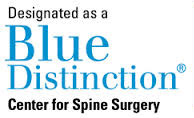Why Are So Many People Afraid of Spine Surgery?

Do you have a spine problem but are reluctant to see a spine specialist for fear of bad news? You’re not alone. Most people are nervous about anything to do with spine surgery. While that’s understandable, the latest advancements and technologies provide a level of safety and non-surgical options never before available.
With any surgery, it’s wise to first explore all the less-invasive options. It’s also true that the spine is very complex, making it especially important to receive the proper diagnosis and treatment.
Surgery is Often Not Necessary
The fact is, at our Saratoga Spine practice over 85% of our patients don’t need surgery. So, far more often than not, surgery is not recommended. The options of physical therapy, medications or injections often provide significant relief.
Advancements in Surgical Technology
Many people are also not aware of the many advancements that have been made in spine surgery in recent times. For example, many do not know that the introduction of robotics and image-guided surgery has made spinal surgery much safer and more effective. Many of these types of surgeries also mean that there are smaller incisions and less blood loss. This makes for a faster return to normal daily activities.
Many factors contribute to the increased safety of spine surgeries:
- Minimally Invasive Techniques: Many spine surgeries today are performed using minimally invasive techniques. These procedures use smaller incisions, cause less tissue damage, and often lead to quicker recovery times and fewer complications.
- Advanced Imaging: Modern imaging techniques such as MRI, CT scans, and real-time X-rays (fluoroscopy) provide surgeons with detailed views of the spine. This allows for more accurate diagnosis and precise surgical interventions.
- Improved Anesthesia: Advances in anesthesia ensure that patients remain comfortable during the procedure and have fewer complications associated with being under anesthesia.
- Specialized Training: Finding surgeons who are specifically trained in spine surgery often translates to better outcomes for patients.
- Better Post-operative Care: Enhanced recovery protocols and post-operative care, including physical therapy and pain management strategies, support better patient outcomes and reduced post-surgery complications.
- Computer Navigation & Robotics: These technologies help to increase the precision of spinal procedures, potentially reducing complications and improving outcomes.
However, there are inherent risks with any surgical procedure, and spine surgery is no exception.
Caution Counts
Even if surgery is likely to benefit you, you should also keep in mind that many spine surgeons will not perform the operation you need if you do not meet certain criteria. For example:
- Be at a healthy weight. It’s known that obesity can lead to undesired surgical outcomes.
- Manage diabetes. Many surgeries have a greater risk with diabetes because of the higher risk of cardiovascular complications and possible infections.
- Stop smoking. Smokers are more likely to have problems with wound healing and blood clots.
Finding the Right Spine Surgeon
To increase the chances of a successful spine surgery, it is also advised that you choose a surgeon who devotes his or her practice solely to caring for patients with problems of the spine. This means the physician is likely to be more aware of and skilled in the newer technologies and techniques than a physician who does not see spine patients all the time.
Here are some additional considerations when looking for the right spine surgeon:
- Open to questions. You want to feel comfortable about your decision, and you want someone who is highly knowledgeable and caring. This includes reviewing not just your treatment options but also the expectations for recovery and the post-operative plans for you.
- Is open to and knowledgeable about the non-surgical options. You want a surgeon whose philosophy is that surgery is not necessarily the best option.
In summary, you should understand that part of the surgeon’s role is to educate and guide you in your decision as to whether or not you should have surgery. You will have found the right spine surgeon when you feel you have been presented with all the options and feel clear on the potential risks and likely results.
